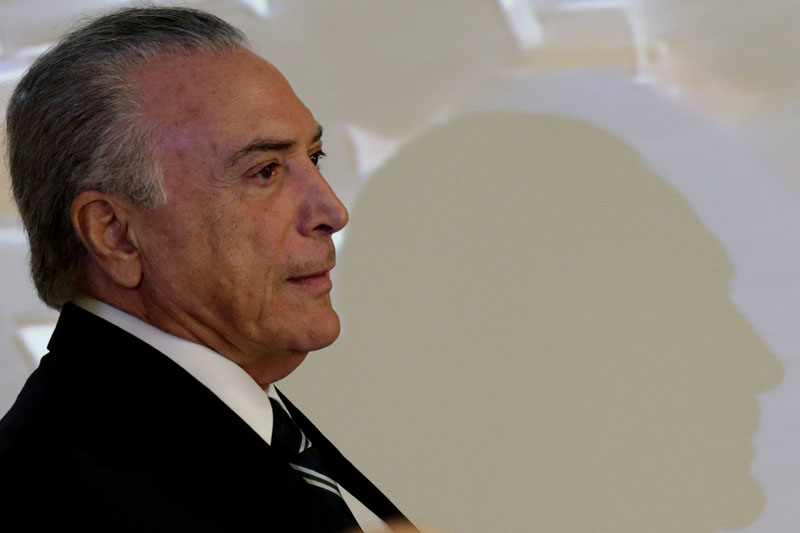Head of Brazil electoral court sees Temer surviving election case
BRASILIA: The head of Brazil's top electoral authority said on Wednesday that President Michel Temer would not necessarily lose power if his 2014 election was annulled on charges of illegal campaign financing because he was not the head of the ticket.
A federal judge is expected to recommend the annulment in the coming months following testimony from executives of engineering group Odebrecht alleging 300 million reais ($95 million) in illicit donations to the campaign, in which Temer was the vice presidential running mate to Dilma Rousseff.
Centrist Temer took over the presidency following the impeachment of the left-leaning Rousseff in May for breaking budgetary rules.
If he can stay in power it could allow him to press on with fiscal reforms and austerity policies that have lifted Brazil's currency and stocks and raised chances the country will emerge from a deep recession this year.
Supreme Court Justice Gilmar Mendes, who heads the Supreme Electoral Tribunal (TSE) overseeing the case, said a first ruling by the federal judge was not expected before June.
The plenary of the electoral court could then take until next year to reach a definitive decision on whether to annul the election result, said Mendes, who is linked to the PSDB party which is part of Temer's coalition.
Even if the court ruled in favor of doing so, Temer would not lose his political rights because Rousseff would be legally responsible for any wrongdoing as the head of the ticket, Mendes said.
"It is obvious that the vice president takes part in the election campaign but the one who is responsible for the slate is the president, the head of the ticket," Mendes told Reuters.
Because of the proximity to October 2018 presidential elections, Congress would have to choose a candidate to serve out the rest of the term - with Temer eligible to contest the vote in a chamber packed with his allies.
Mendes' views echoed those of leaders of Temer's PMDB party who are keen to see the president weather the current crisis, which has been fueled in part by a massive corruption scandal surrounding political kickbacks at state-run companies that has tainted the ruling coalition.
While Temer has won the favor of investors with an agenda of belt-tightening and welfare reform, his popularity among ordinary Brazilians has dwindled amid the country's worst recession on record. His government predicts a mild economic recovery this year.
Senate President Eunicio Oliveira, a member of the PMDB, said on Monday Temer could be a candidate if Congress had to pick someone to serve out the presidential term until next year's elections.
Mendes said that a raft of testimony by the 77 Odebrecht executives concerning illicit payments to politicians could delay any initial decision on the electoral vote beyond June, as new evidence would need to be analyzed and new witnesses called.
"There is the possibility of a delay," he said, adding that this would also push back any decision by the plenary, which could request further investigations.
"The plenary could ask for more time. We cannot rule out this case extending into 2018."
Damaging new evidence was given last week by the jailed former CEO of Brazil's largest engineering firm, Marcelo Odebrecht, who confirmed to the judge handling the case that his company made illegal donations to the Rousseff-Temer campaign.
Brazil's political establishment is bracing for the publication of the plea bargain statements by Odebrecht employees. Brazil's public prosecutor is considering opening investigations into senior government ministers and several senators allied to Temer's government, sources told Reuters.






